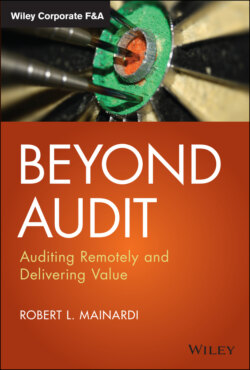Читать книгу Beyond Audit - Robert L. Mainardi - Страница 12
UNDERSTANDING YOUR ROLE
ОглавлениеThe analysis and explanation start with a remarkably simple question. As an auditor, could you do your job effectively without your business client? The simple answer to that question is no. There is no chance for an auditor to build effective (detailed) business knowledge, understand policies and procedures, document the business objective(s), recognize workarounds, gather pertinent business data, answer process questions, develop a detailed test plan, validate potential deviations from the work standard, identify root causes, create process-based recommendations, generate a clear, concise report, and verify action plan implementation and adoption without client participation. It would be a losing battle, not to mention a very time-consuming approach filled with business process assumptions. No auditor would want to generate an audit work file, and especially not an audit report, without having a clear understanding of the business and its corresponding objectives.
Now flip the question around. Could the business team do their job and complete their assigned responsibilities without internal audit involvement? The unfortunate answer to that question is yes. Absolutely, without a doubt, the business team could do their job with no internal audit help or intervention. If you asked the business process workers, they would all probably say their preference would be to perform their day-to-day responsibilities and activities without having to deal with anyone from audit. The business teams view internal audit as a nuisance, a bother, and an unnecessary interruption to their work. So, if the business team prefers no outside audit interference, how are auditors to go about breaking down the preexisting barrier that has been in existence forever? The answer is, through a dedicated effort on the part of the auditors to constantly be focused on the relationship.
While this fact of auditor “need” when it comes to client involvement during audits is daunting, there is a glimmer of good news. The need is not an insurmountable barrier but does represent a significant challenge to every auditor. But to overcome this barrier, the auditor will have to recognize and accept one indisputable fact when it comes to the internal audit and business partner relationship. And that fact is, no matter what type of relationship is being discussed – whether it is boyfriend and girlfriend, husband and wife, or auditor and client – there is always one person in every relationship who wants it a little more than the other. Okay. So, what does that mean? It means one person will always work harder and be more flexible to ensure the relationship continues to grow and stay strong. Auditors must realize early on in the relationship development process that we are the party recognizing we will have to work harder and be more flexible than our business partner to ensure the relationship stays strong and intact. What I must clarify for you is in recognition that the auditor must put in more time, effort, and dedication to foster the audit and client relationship. It does not mean in any way shape or form that the auditor should bend the rules or requirements during the audit itself. During the engagement, the auditor should keep the business partner “in the know” and ensure the work, status of project request, completed testing, preliminary results, and any potential issues should be reviewed, discussed, and validated with the business partner to ensure they are never in the dark when it comes to the audit status. While this might seem like common sense, there are often times when auditors forget to communicate the details of potential findings or work statuses. Surprises are fun and usually a good thing, except during an audit. If you want to keep your relationships strong with your business partners, always remember the role that clear, prepared, supported communication plays in developing, fostering, and maintaining relationships. Too often, auditors enter into exchanges (formal meetings or hallway discussions) with clients unprepared. I know this is not something you would do, but let us discuss the potential impact not only on the relationship with your client but also the development of the auditor.
A critical point that must be emphasized here is being prepared. You can never be too prepared for a meeting. Believe me, I know all the excuses for not preparing effectively for a meeting. You could say, I do not want to prepare too much because it will come off disingenuous. That is false. Being prepared does not mean to memorize what you are going to say. If you memorize what you want to say it will come off as fake and robotic. However, if you prepare effectively, it will show you are committed to the topic, understand the details, know where the data originated, and can effectively explain questions regarding the subject matter. If you do not adequately prepare, how will you know when to stop asking questions or when you have the information or data required? The keys to effective preparation for any meeting with a client are understanding the meeting objective and mastering the data to be discussed. With these two keys, any auditor can effectively and confidently communicate with the business partner. So, let's touch on both, briefly, to ensure everyone is on the same page.
